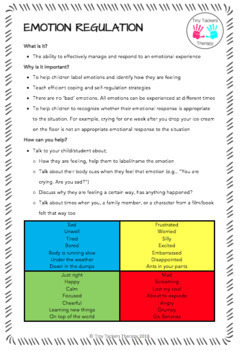Self Regulation For Parents
Self Regulation for Parents: A Guide to Nurturing Emotional Intelligence in Children
Parenting is a beautiful journey, filled with ups and downs, joys and challenges. One of the key aspects of raising well-rounded children is teaching them the skill of self-regulation. Self-regulation is the ability to manage one's emotions, thoughts, and behaviors effectively, enabling children to navigate through life's ups and downs with confidence and resilience.
Why is Self-Regulation Important?
As parents, we want our children to grow up to be emotionally intelligent individuals who can handle stress, control their impulses, and maintain healthy relationships. Self-regulation is the foundation for these crucial life skills. It is not only essential for a child's overall well-being but also plays a significant role in their academic success and social interactions.
How Can You Foster Self-Regulation in Your Child?
1. Teach Emotional Awareness: 
Start by helping your child identify and label their emotions. By using descriptive words like happy, sad, angry, or frustrated, you can support their emotional awareness. Encourage them to express their feelings in a healthy and respectful way.
2. Model Self-Regulation: 
Children learn best by observing their parents and caregivers. Set an example by exhibiting self-control in your own emotions and reactions. When faced with a challenging situation, take a deep breath, remain calm, and respond thoughtfully. This will help your child understand how to regulate their emotions effectively.
3. Establish Routines and Boundaries: 
Children thrive in structured environments. Establishing daily routines and clear boundaries can provide them with a sense of security and stability, making it easier for them to regulate their emotions and behaviors. Ensure that the routines include time for relaxation, play, and self-reflection.
The Benefits of Self-Regulation
By fostering self-regulation in your child, you are setting them up for success in various aspects of their life. Here are some key benefits:
1. Emotional Resilience: 
Children who can regulate their emotions are more resilient and better equipped to handle stress and adversity. They are less likely to become overwhelmed by challenging situations and can bounce back quicker, developing vital coping mechanisms for the future.
2. Improved Academic Performance: 
Self-regulation is closely linked to academic success. Children who can regulate their thoughts, impulses, and attention span perform better in school. They are able to focus on tasks, follow instructions, and manage their time effectively, leading to improved academic achievements.
3. Healthy Social Relationships: 
Self-regulated children have healthier and more satisfying social relationships. They are better equipped to express their needs assertively, empathize with others, and navigate conflicts effectively. These skills lay the foundation for positive and meaningful connections throughout their lives.
FAQs - Answering Your Burning Questions
Q: How early should I start helping my child develop self-regulation skills?
A: It is never too early to start teaching your child about emotions and self-regulation. Babies and toddlers can begin learning basic emotional vocabulary, and as they grow, you can gradually introduce them to more advanced techniques for managing their emotions.
Q: What can I do if my child has difficulty regulating their emotions?
A: Every child is unique, and some may require more support in developing self-regulation skills. If you notice your child consistently struggling, consider seeking guidance from a pediatrician or a child psychologist who specializes in emotional development.
Q: How can technology hinder or support self-regulation in children?
A: While technology can be a useful tool for learning, excessive screen time can hinder self-regulation. Establish healthy boundaries around screen time and encourage engaging in activities that promote face-to-face interactions, physical exercise, and creativity.
Q: Can a child with a neurodevelopmental disorder still learn self-regulation?
A: Absolutely! Children with neurodevelopmental disorders may face unique challenges, but through appropriate support and guidance, they can still learn and develop self-regulation skills. Seeking professional assistance from specialists familiar with these disorders can be beneficial.
Q: How can I stay patient and calm when my child is struggling with self-regulation?
A: Remember that parenting is a journey, and it is normal to feel overwhelmed at times. Prioritize self-care, practice mindfulness, and seek support from other parents or professionals who can provide guidance and reassurance.
In Conclusion
Teaching self-regulation to your child is an investment that will yield lifelong benefits. By nurturing this crucial skill, you are empowering your child to navigate their emotions, build resilience, and thrive in all aspects of their life. Remember to be patient, lead by example, and enjoy the process of watching your child grow into a confident, emotionally intelligent individual.
Sources: - Teaching Kids Self Regulation | Parenting skills, Emotional child - Self Regulation - Parent/Teacher Handout by Tiny Tackers Therapy
Self Regulation - Parent/Teacher Handout By Tiny Tackers Therapy
 Image Source : www.teacherspayteachers.com
Image Source : www.teacherspayteachers.com regulation handout self parent emotion teacher 1613 followers
Ideas On How Parents Can Support Self-regulation, Such As Including
 Image Source : www.pinterest.com
Image Source : www.pinterest.com emotional
Pin On ADHD Tips For Parents
 Image Source : www.pinterest.com
Image Source : www.pinterest.com self regulation adhd skills parents parenting tips books children help child choose board
Parents Zone - ApplesChild
Pin On Co Parenting
 Image Source : www.pinterest.com
Image Source : www.pinterest.com regulation choose board strategies parents parenting
Excellent #parents Tips Are Readily Available On Our Website. Read More
 Image Source : www.pinterest.com
Image Source : www.pinterest.com regulation boar parentingforbrain
How To Make Parents Aware Of Self Regulation - Parenting Info
 Image Source : parentinginfes.blogspot.com
Image Source : parentinginfes.blogspot.com parenting mindful
Teaching Kids Self Regulation | Parenting Skills, Emotional Child
 Image Source : www.pinterest.com
Image Source : www.pinterest.com regulation
Teaching kids self regulation. Regulation handout self parent emotion teacher 1613 followers. Pin on co parenting. Regulation choose board strategies parents parenting. Self regulation